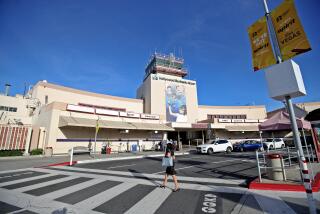Getting a Grip When You Lose Your Luggage : Airlines: Trying to locate lost baggage, or getting fair compensation when bags can’t be found, can be exasperating. But for those willing to fight, there is hope.
- Share via
Consider the case of one Stanley Arkin. On Feb. 21, 1988, Arkin, a well-known litigation attorney based in New York, was rushing to catch his British Airways Concorde flight from New York’s John F. Kennedy Airport to London.
He boarded his connecting helicopter flight at New York’s 34th Street Heliport after checking in his two bags. They were tagged all the way through to London on board British Airways Flight 176--a service the helicopter company offered in conjunction with the airline.
The helicopter arrived at JFK at 7:40 p.m., with plenty of time for Arkin--and his bags--to make the flight.
But when Arkin arrived in London, his bags never made it. “I had no clothing, no nothing,” he said.
Arkin filed the usual claim forms with the airline, and waited. But his bags never arrived.
The airline investigated and found that the bags had not been delivered to British Airways from the New York helicopter until 6:10 a.m. the following morning, when they were left at the British Airways baggage room. And then, the bags disappeared.
That’s when Arkin learned how much the airline was prepared to compensate him: virtually nothing. He had lost valuable papers, all of his work, his clothing and other expensive items. But all British Airways wanted to pay him was $1,269.80.
Arkin was the latest international passenger to make the painful discovery of the official provisions of the Warsaw Convention.
How did the airline arrive at the sum of $1,269.80?
Printed on the back of every airline ticket is the airline’s official liability in the case of lost baggage on international flights: The airline is only required to pay $9.07 per pound for lost baggage. Under airline rules, the maximum free allowance for each piece of luggage for a flight originating in the United States is 70 pounds. Two bags were lost (140 pounds), multiplied by $9.07.
And how did the figure $9.07 come about? The actual figure is $20 paid per kilogram (2.2 pounds) of baggage.
Then, consider that provisions from the Warsaw Convention were first adopted in 1917. While they were later amended, the provisions effectively protect international airlines from having to pay out huge settlements in the event of passenger death, injury, disability or lost baggage.
For example, in the case of “wrongful death” resulting from an airline accident, the Warsaw Convention limits airline liability to $75,000 per victim.
Many of the provisions of the Warsaw Convention--including the death payment--have been successfully challenged in court. As a result, wrongful-death settlements for most major airline crash cases have consistently exceeded the $75,000 “limit.” But few passengers have ever been victorious in challenging the baggage limits.
One is Stanley Arkin. He sued British Airlines, New York Helicopter and Ogden Allied (the firm contracted to transfer baggage at JFK) for damages, and challenged the Warsaw provisions.
All three defendants filed a motion to dismiss, claiming protection under terms of the Warsaw Convention.
In virtually every case of its kind, the courts have affirmed the convention and granted the motion. Arkin’s case was no exception. The initial trial court granted the motion to dismiss, citing the terms of the convention. Arkin, it seemed, had lost.
Most airline passengers have neither the fortitude nor the deep pockets to pursue such cases further. But Arkin is, after all, a litigation attorney. He appealed the ruling to the appellate division.
“My argument was that the Warsaw Convention was essentially an anachronism,” he says. “It was originally adopted to sustain an infant industry. It kept liability limits low to nurture that industry. But today, it is more often than not Draconian in nature. And airlines attempt to interpret it strictly.”
It was in that strict interpretation of the Warsaw Convention that Arkin found his loophole to sustain his appeal. It seems that when Arkin checked in for his flight, the weight of his bags was not noted on his tickets, which is required under terms of the Warsaw Convention.
Article 4 of the convention states that “if the baggage check does not contain the ‘weight of the luggage’ the carrier shall not be entitled to avail himself of those provisions of the convention which exclude or limit his liability.”
Bingo.
“As long as the airlines wanted to interpret it strictly, so could I,” Arkin argued.
More than a year after the incident, the appellate division of the New York Supreme Court reversed the earlier ruling and found for Arkin.
The case was eventually settled out of court for an undisclosed but substantial sum. “As part of the settlement agreement,” Arkin says, “I’m bound not to reveal the terms of the settlement.”
“In cases like these,” says an attorney familiar with this case and others, “airlines are afraid of setting precedent. So they always settle out of court.”
However, the fact that these cases can--and do --go to court is evidence itself that the Warsaw Convention can be tested by passengers who think they’ve been abused when their bags are lost and they receive minimal compensation.
This is important information when it comes to taking an international flight. If the counter agent who checks you in fails to note the weight of the bags on your passenger coupon, you can then claim real dollar damages if the airline loses your bags and your loss exceeds what they want to pay you.
But what about domestic flights? Under current Department of Transportation regulations, carrier liability limits are $1,250. That’s not $1,250 per bag , but per incident . In addition, U.S. carriers will always ask you to itemize what was in the luggage and provide receipts for proof of purchase.
Then, the airlines will offer only the depreciated value of the lost items. Last but not least, in many cases, the airlines will try to offer you travel vouchers for future flights on the airline in lieu of cash. In most cases, stand your ground and demand the cash.
What else can you do? Certain credit cards offer baggage-loss insurance if you charge your airline tickets to the particular charge card. However, read the fine print. This is not primary insurance. It only kicks in after the airline liability limits have been reached, and if you are also not covered under a homeowner or property “floater” policy.
More to Read
Inside the business of entertainment
The Wide Shot brings you news, analysis and insights on everything from streaming wars to production — and what it all means for the future.
You may occasionally receive promotional content from the Los Angeles Times.










